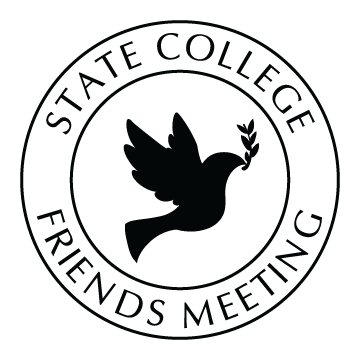We welcome you to our meeting for worship and hope that you may find here a source of help and strength, just as your presence will strengthen us.
While Quakerism is historically rooted in the Christian faith of its founders, beliefs among today’s Quakers vary concerning the experience of the Divine.
Those not familiar with Quakerism should note that worship begins as we gather in silence in the meeting room. There is no appointed minister or programmed service, and we take no monetary offering.
We have few rituals, because to us, all living is a sacrament. We have no paid ministers because each of us shares in the responsibility of ministry. We recite no prepared prayers because we believe all our prayers—both spoken and unspoken—are a direct communion with the Infinite.
Friends believe that the spirit of God is a Light within each of us and may be most clearly discerned in a living silence. Worship is not dependent on the outward actions of any one person, but flows through the meeting from the time the group settles into silence.
This settling is sometimes called “centering,” as we clear our minds of our familiar interior conversations and thoughts to focus on the spiritual. Centering, or opening ourselves to the expectant silence, is not always easy, even for longtime Friends.
Quaker worship is individual as well as communal, and each worshiper may experience or approach the silence differently. Some Friends meditate; others pray; yet others may reflect on inspiring literature or events. Quaker worship is a discipline that practice makes more rewarding. In this way, the silence itself may become an eloquent experience of the Divine.
However, a spiritual message or prayer may become so compelling as to force one of us to rise and briefly speak. Friends try to enter meeting free of any determination to speak, and those who feel the urge to speak will reflect inwardly to test whether it is spirit-led or a personal urge to share a thought.
These queries help us to discern whether we should speak:
Is this message from a Divine source or from some other source?
Is this message meant to be shared or is it for me alone?
Is this message meant to be shared today in this way?
The quality of worship is best preserved when messages do not follow too quickly on one another and when messages refrain from opening or continuing a discussion, championing a public cause, or exploring purely personal issues. Sometimes in meeting for worship, the silence is unbroken by any message.
While every meeting for worship follows the same outward path, each is a unique combination of the shared silence, spirit, and vocal messages of those present. Occasionally a meeting for worship develops a deep, communal silence from which the messages seem to bring forth a new truth. We call this “profound and evident sense of unity in the presence of the Divine and of one another” a gathered meeting.
This belief in continuing revelation is one reason why Friends have never endorsed any set creed. Instead, we have a tradition of testimonies in the areas of simplicity, integrity, equality, peace, and social concerns. From the beginning in the early 1650’s, Friends have been encouraged to “let your lives speak” and today Quaker meetings still offer support to those who seek to align their lives with their beliefs.
During the school year, children join meeting for worship for the first 15 minutes and then go to their First day classes.
Meeting ends after an hour or so, when a designated Friend shakes hands with a neighbor, followed by everyone doing so. This Friend then introduces a period of “worship sharing,” when Friends are encouraged to share their joys, sorrows, or concerns. After singing, introductions, and announcements, we adjourn to the social room for refreshments.
If you’d like to know more about Quakers and Quakerism, please feel free to chat with us—especially with the greeters who are introduced after meeting for worship. Many Friends can also recommend helpful literature.
What We Believe
For Friends, God is a loving presence. Every soul is akin to the Divine and therefore every person may in some degree understand the Divine and respond to it. We gather in silence to seek together a fuller knowledge of God and an understanding of its practical implications for our lives.
The beliefs of Friends in general, and State College Friends in particular, are quite diverse. We have no set creed. Early Quakers were Christian and tried to recreate early, primitive Christianity. In our meeting, some of us consider ourselves orthodox Christians, some of us consider ourselves Christian in some broader sense, and some of us do not consider ourselves as Christians at all. Most of us became Friends as adults, and bring along parts of our religious heritage. The diversity of our beliefs is a strength we can all draw on.
Friends have no sacraments or rituals because all living is, to us, a sacrament. We have no paid ministers because each of us should share in the responsibility of ministry. We have no prepared prayers because our unspoken and spoken prayers are a direct communication with the Infinite. We worship in a living silence where dwells the eternal presence of God.
Friends have a long tradition of living testimony in the areas of simplicity, peace, integrity, equality, and social concerns. We express these concerns in our own actions, and through support of the American Friends Service Committee, Friends Committee on National Legislation, The Quaker UN Program, and Friends’ schools and colleges.
We welcome as members any who share our principles and convictions, and are pleased to accept membership applications from attenders who have taken time to consider their applications thoughtfully. The clerk, members of the Worship and Ministry Committee, or other members of the meeting will be glad to discuss Friends’ faith and practice with you and to recommend Quaker literature.

